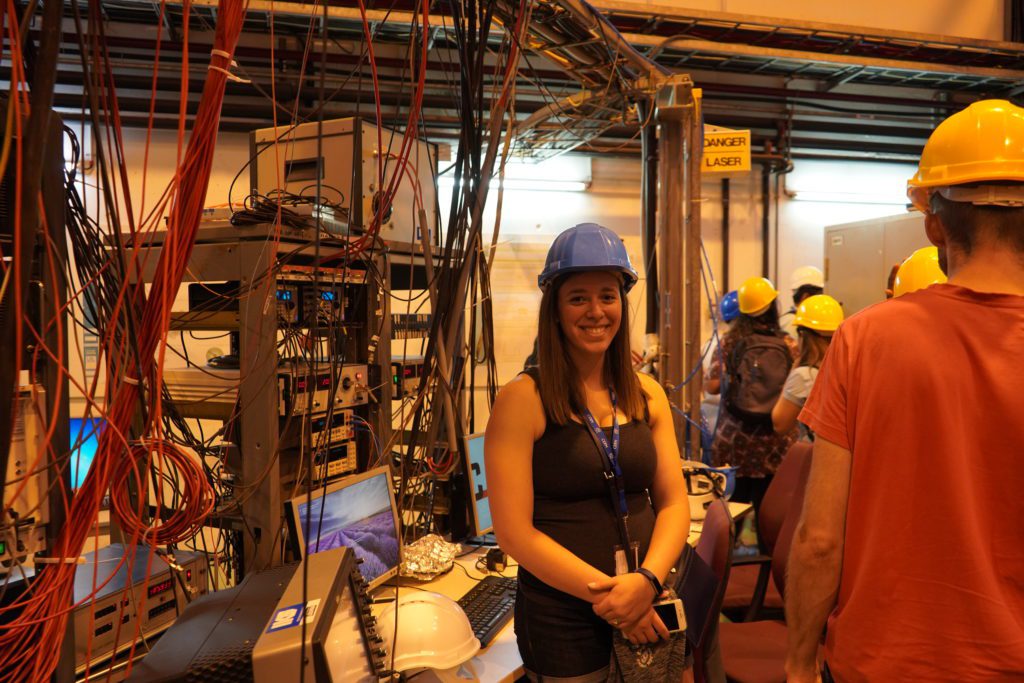Kenan Fellows Voices: Alexandra Boyd
 As a 2015-16 Kenan Fellow, I learned the importance of incorporating outside experiences in my classroom to show students why the content I teach is important and relevant to their lives. After completing my Kenan Fellowship, I have worked hard to find more and more professional learning experiences that will help me do just that.
As a 2015-16 Kenan Fellow, I learned the importance of incorporating outside experiences in my classroom to show students why the content I teach is important and relevant to their lives. After completing my Kenan Fellowship, I have worked hard to find more and more professional learning experiences that will help me do just that.
One of those opportunities was the chance to attend the CERN High School Teacher Programme in Geneva, Switzerland in July. CERN, the European Organization for Nuclear Research, is renowned for its high-level particle physics research as well as its dedication to educating the public on the importance of continued scientific research. One way they do this is through a three-week program for high school teachers from around the world. I was lucky enough to be chosen this year, thanks to QuarkNet, a nonprofit committed to providing high school science teachers with opportunities to gain experience in real scientific research. The nonprofit sponsors five U.S. educators to participate in the CERN Programme each year. I was the only North Carolina teacher invited to attend.
The Programme allowed me to learn about particle physics, experience a day in the life of a CERN scientist, and become a better educator through lectures, tours, hands-on activities, and time to create and reflect on those experiences. Every day we had at least one lecture on varied topics such as particle physics, cosmology, gender equality in education, and antimatter. Each lecture was presented by a highly-esteemed member of the CERN staff and was absolutely wonderful. I don’t know that I’ve ever been so excited to attend a lecture, let alone one or two every day for three weeks.
My absolute favorite lecture was by Michael Doser, a physicist at CERN whose research focuses on matter — antimatter asymmetry. Even though a lecture on antimatter sounds pretty cool (at least to me it does) I was inspired by his ability to draw his audience into the topic and without relinquishing our attention for even a moment. I felt like he was having a conversation with us, unraveling the intricacies of antimatter and weaving a story starting from the Big Bang. As teachers, we can always appreciate when someone is able to explain a complex topic in a way that is accessible for all learners.
When we weren’t in lectures, we toured CERN’s campus. We visited the synchrocyclotron, CERN’s first accelerator, on our first full day of the program; built cloud chambers in the S’Cool Lab, a workshop for high school students; toured the CERN control centre and much more. Each tour synced up with the lecture we had that day to provide context to the theories we were learning. While we didn’t get to go underground to see the Large Hadron Collider (LHC) because it is currently operational, we did get to see all of the other projects that came before it and work concurrently with it. As a physicist and educator, I could not have dreamed of a better “field trip”.
As part of the program, we were divided into teams and assigned a topic to investigate with the goal of creating a product to bring back to our classrooms. My group focused on particle accelerators and how we can teach our physics curriculum through the lens of particle accelerators. Since we rarely have time to insert new units into a tight curriculum, we identified subjects that overlapped with the content we already teach and outlined ways to incorporate them throughout the school year. It was incredibly motivating to work with a team and have a solid plan to take back with us for the upcoming school year.
This was a once-in-a-lifetime experience, and one I will not soon forget. We were treated like professionals and were given the tools to learn about all of the research being conducted at CERN and across the globe. Through this unbelievable opportunity, I will be able to return to my classroom reinvigorated and able to help my students see what kind of opportunities they have available to them in the scientific field.
Alexandra Boyd, a 2015-16 Kenan Fellow, is in her sixth year of teaching and her first year at Apex Friendship High School where she teaches all levels of physics. She was named the 2017 PhysTEC National Physics Teacher of the Year.